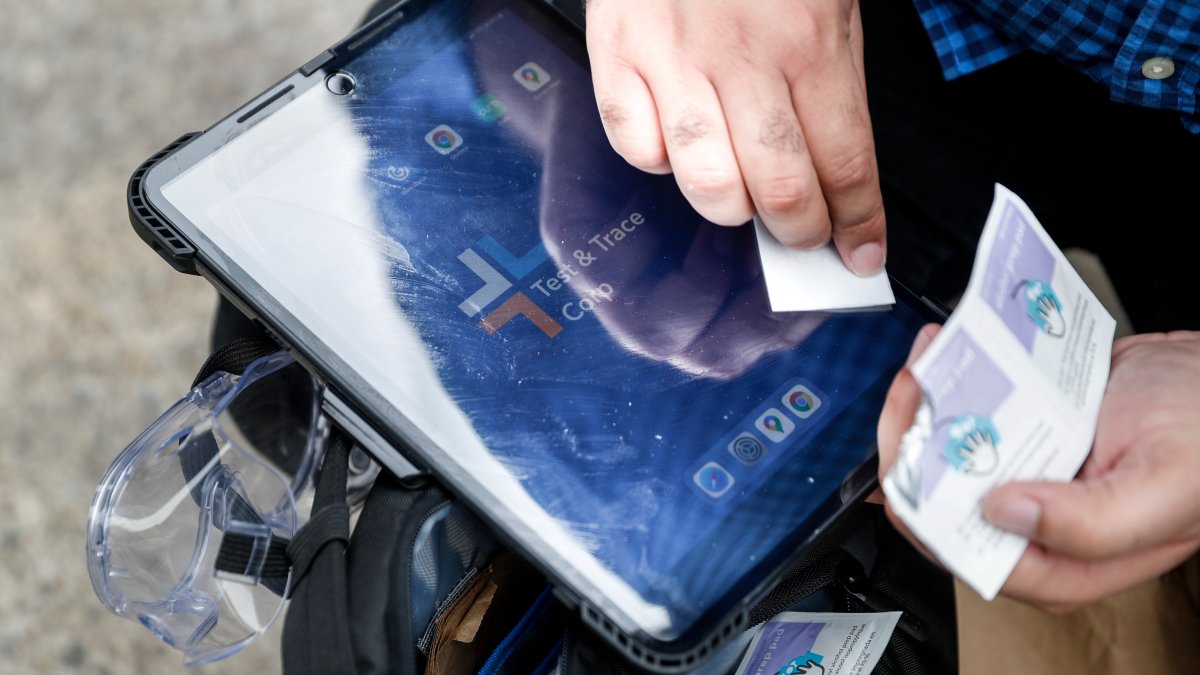Contact Tracing Takes Back Seat During Latest COVID Surge – NBC 5 Dallas-Fort Worth
US health investigators are finding it nearly impossible to keep up with the tide of new COVID-19 infections and conduct contact tracing measures that were once considered a pillar of the country’s pandemic response.
The states are hiring new staff and seeking volunteers to bolster the number of contact tracers overwhelmed by rising coronavirus cases.
Some states cut their contact tracing teams this spring and summer as virus numbers fell and are now making efforts to train new investigators. Others have designed their teams to focus on those most at risk, such as cases involving schools or children who are too young to be vaccinated.
Texas has completely pulled out of business, and the new biennial state budget, which goes into effect Sept. 1, specifically prohibits the use of contact tracing funds.
That left it to the local health authorities, but they can’t keep up at a time when Texas averages more than 16,000 new cases a day.
Mississippi has 150 employees working full-time identifying people who have been in close contact with an infected person, but they too are overwhelmed.
“Many times when cases are reported, the transmission has already taken place by the time we reach this person,” said state epidemiologist Dr. Paul Byers.
Since the pandemic began, states have relied on contact tracing practices to track down, notify, and monitor those who have been exposed to someone who tests positive for the coronavirus.
Dr. Yvonne Maldonado, professor of global health and infectious diseases at Stanford University School of Medicine, said that while contact tracing can be time consuming, especially when a person may have exposed many people, “it ends up preventing” additional cases. “
Maldonado said it was a “public health pillar” and could be the only way to find out that a stranger may have exposed you to the disease.
The response to the contact tracing varied from state to state during the pandemic.
New York, which has a resilient team, has adapted its contract tracking staff to the waves of the pandemic. The state had more than 8,000 contract enforcement agencies in February and March this year, but it now has 3,860 employees working on contract prosecution. That doesn’t include New York City, which has its own $ 600 million traceability initiative with thousands of employees.
Arkansas has hired two outside firms, General Dynamics Information Technology and Arkansas Foundation for Medical Care, to conduct the investigation for the state. The companies currently have about 257 employees and are trying to add about 100 more each.
In Louisiana, another virus hotspot, state officials have added 130 people to their staff working on contact tracing in the past few weeks. You now have more than 560 people working on the tracking effort.
In Idaho, a new public health website, VolunteerIdaho.com, encourages people with medical skills or a simple willingness to volunteer with the Idaho Medical Reserve Corps. Among the volunteers they are looking for are people who can contact tracking and data entry
Health officials say with the overwhelming number of new cases, they are unable to keep track of every case and are instead trying to focus on infections that large numbers of people or groups at risk may have exposed.
That’s the case in Alabama. Dr. Karen Landers of the Alabama Department of Health said her agency encourages anyone who tests positive or is exposed to follow isolation and quarantine guidelines and notify anyone they’ve had close contact with, but the Department of Health is focusing its resources on larger outbreaks, Cluster and group settings.
In Nevada, investigators are prioritizing efforts on cases involving children or schools, according to Julia Peek, assistant administrator for Community Health Services at the Nevada Department of Health.
In Texas, Governor Greg Abbott approved a $ 295 million contract with a state contact tracing firm last year, but the deal sparked conservative backlash and a lawsuit from lawmakers who said the governor had exceeded his powers by he approved the deal with the legislature was not in session.
Abbott eventually won the lawsuit, but the contact tracing funds were removed from the new budget.
Local governments say they will continue efforts and try to increase staff as cases increase. In Austin, for example, the local health department employed about 50 investigators who worked on contact tracing during the height of the pandemic.
But as cases fell, they reduced their staff to 12, Austin Public Health spokesperson Matt Lara told Matt Lara.
In California, state workers were posted to assist the county’s health department teams with contract tracking. At the height of the pandemic, around 2,800 people in Los Angeles county had been working on the effort by this spring when cases began to decline, said True Beck, a public health worker who leads a team of contract tracers for the county .
Beck said some employees were reassigned in the spring to make calls to encourage people to get vaccines and others were sent back to their regular jobs in other county departments, but recently they have been bringing people back and have been around 1,000 work.
She said the work was tireless and the calls, which could last an hour, could be emotional. Employees making contract tracking calls not only help people learn what they should do to protect themselves and others, but they can also hear from people who are scared, lonely, grieving, or in need of help, such as when they are at home. Beck said her team’s staff are trying to help and connect people to other resources.
“It’s hard calling perfect strangers day in and day out,” she said.
She said people are no longer as eager to speak or have interviews as they used to be in the pandemic when there was much more fear and unknown about the virus.
“Now I think people are a little fed up with COVID. I think we all honestly are.”
[ad_1]


